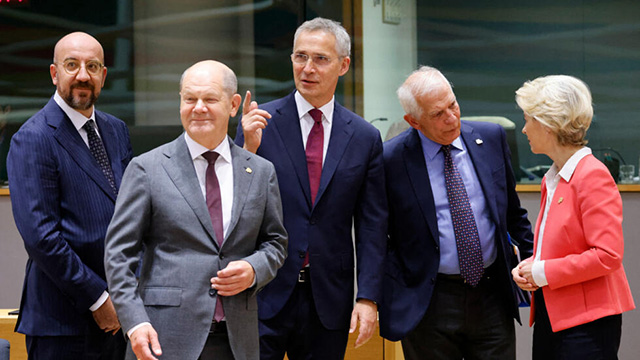 European leaders as they are.
European leaders as they are.
Facing a new sense of urgency, EU leaders have met in Brussels to discuss making military support to Ukraine more sustainable while ramping up their own defences, writes Euractiv.
Over the past weeks, EU member states have voiced increasing alarm over the state of the war in Ukraine, more often describing it as an “existential threat”.
Two years since Russia’s full-scale invasion, meanwhile, Ukraine’s military is struggling with significantly reduced weapons supplies from the West, leading to difficulties in repelling Russian troops.
“Into the third year of Russia’s war of aggression against Ukraine, we face a pivotal moment,” European Council President Charles Michel wrote in his invitation letter for the summit, adding: “Urgency, intensity and unwavering determination are imperative.”
“There is a growing sense that Russia will not stop at Ukraine,” EU’s chief diplomat Josep Borrell told a group of reporters, including Euractiv, in Brussels this week.
“Keep in mind that for Russia, it’s enough not to lose,.. Russia believes the time is on [its] side,” Borrell said.
“Given the urgency of the situation”, EU leaders are “determined to continue providing Ukraine and its people with all the necessary political, financial, economic, humanitarian, military and diplomatic support for as long as it takes and as intensely as needed”, according to the summit conclusions.
But EU diplomats believe the bigger takeaway from this week’s EU summit will be whether the sense of unity can hold, not what will be written on the paper.
The discussions in Brussels come amid discord between France and Germany over their respective Ukraine strategies.
French President Emmanuel Macron’s increasingly hawkish rhetoric, including his call for Western troops on the ground in Ukraine, has irritated Berlin, especially with Paris urging Europe not to act as “cowards” in the face of a Russian threat.
Macron’s ‘conversion’ from dove to hawk on Russia’s invasion of Ukraine has been welcomed by Eastern Europeans, who long asked for the change, increasingly concerned by what a Russian advance this spring could bring.
However, some EU diplomats have questioned how much of Macron’s new-found alarmism and positioning is purely politics and how much is actual commitment.
If the declared strategic goal is that ‘Russia must not win’, then to achieve that, options to react must be wider and nothing ‘taken off the table’, something an increasing number of EU diplomats believe.
“Europe needs to be defence-ready and shift to a ‘war economy’ mode”, Michel urged earlier this week.
The EU “is committed to increasing its overall defence readiness and capabilities to match its needs and ambition,” according to a summit statement.
“We have to rearrange the social contract,” Lithuania’s Foreign Minister Gabrielius Landsbergis said this week in Brussels, and referenced what he called the ‘Pearl Harbor’- effect.
So far, not all EU member states agree with this view and fear it threatens Europe’s post-Cold War social model.
Achieving the defence spending necessary would force European countries to start reversing the social spending of the last decades
The EU recently agreed on an additional €5 billion for the European Peace Facility (EPF), the bloc’s mechanism to reimburse weapons delivered to Kyiv for new arms shipments to Ukraine.
EU leaders say they “reviewed progress” on using the revenues “for the benefit of Ukraine, including possibly for funding military support” and ask EU bodies to “take work forward”.
On top of all France, Estonia, and Poland have been pushing for joint EU debt in European defence bonds to raise more money for defence. Fiscally cautious Germany, Austria, the Netherlands and Sweden remain sceptical.
read more in our Telegram-channel https://t.me/The_International_Affairs

 10:29 23.03.2024 •
10:29 23.03.2024 •






















